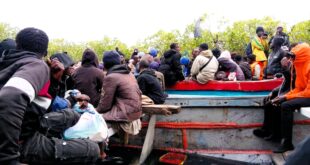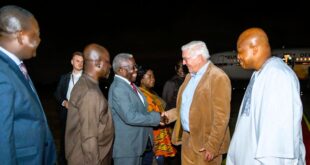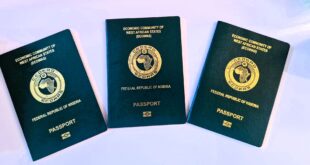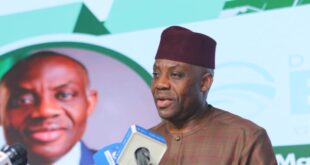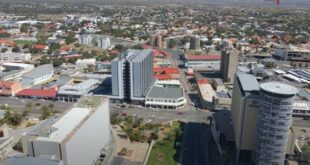Head of the European Union Elections Observer Mission in Kenya, Marietje Schaake, says Augsut 8’s elections should not be a life and death affair.
She stated that Kenyans have shown that all they want is a peaceful, credible and transparent process in the exercise of their democratic rights.
She was speaking in an interview with Daniel Finnan of Radio France International’s English service ahead of the deployment of the mission’s short term observer team for the August 8 general elections.
“Elections should never be a matter of life and death, secondly; security and the ability for every Kenyan to cast his or her ballot according to how he or she wishes in peace and in a secure environment is essential,’‘ Schaake said.
She also weighed in on the murder of the electoral body’s IT chief, Chris Msando, she said the murder underscored the need to increase security for officials of the Independent Electoral and Boundaries Commission (IEBC).
Schaake further described the elections as important not only for Kenyans but for the entire East African region.
The main race will be between President Uhuru Kenyatta, who will be seeking a second and final term, and former Prime Minister Raila Odinga. There are six other candidates on the ballot paper.
Kenya elections are usually dogged with ethnic tensions in an already volatile region. It is often the focus of continental and global players due to its sensitivity. Post-election violence in 2007 claimed over 1,000 Kenyan lives displacing over half a million others.
‘‘The vast majority of Kenyans want these elections to be peaceful transparent and credible, so we assess the extent to which the complete electoral process, the campaign, election day and the aftermath meets the criteria that are spelt out in Kenyan law, the constitution, the electoral code and of course its commitments under international law as well,’‘ she concluded.

Monitoring the elections
The EU has sent off 32 short term election observers to different regions around the country ahead of the Tuesday’s General Election. Schaake explained that the 32 will be joining the existing long-term observers who have been serving the country for the past six weeks.
“In total there will be 130 observers, which is a substantial delegation. We are here because we understand the importance of these elections,” Schaake said.
Meanwhile, Kenya’s Elections Observation Group (ELOG) has concluded plans to deploy about 5,000 observers to monitor Tuesday’s vote.
The group which is made up of civil society and faith-based organizations, met on Saturday in the capital, Nairobi and agreed to deploy about 5,700 election observers.
From the group, about 1,700 observers will also monitor the elections using Parallel Vote Tabulation (PVT).
The PVT Manager at ELOG, Simon Wanjiru, said the group is a non-partisan one, and so its activities will give independent and authentic results. ELOG started monitoring elections in Kenya in 2010.
Wanjiru said that the system would be used as a monitoring mechanism to flag irregularities.
“We want to increase the confidence of the public in the elections and also we want to remove any uncertainties on the people, and they need to believe that now the systems have been done right and we will be able to show if they have been done correctly by the commission,” he said.
The East African country will holds its general elections on Tuesday, the second of its kind under a new constitution.
How Kenyans vote

About 20 million Kenyans are voting for a president and the 350 members of parliament on August 8, 2017.
The main presidential contenders are incumbent President Uhuru Kenyatta and former Prime Minister Raila Odinga.
They are going head-to-head in the elections together with six other candidates including Mohamed Abduba Dida, John Ekuru Longoggy Aukot, Shakhalaga Khwa Jirongo, Japhet Kavinga Kaluyu, Michael Wainaina Mwaura, and Joseph William Nthiga Nyagah.
The East African country practices the two-round voting system for the presidential election. The winner is required to gain over 50% of the votes and at least 25% of the votes in cast in each of more than half of the 47 counties to avoid a second round.
If no candidate wins more than 50% of the votes, the second round shall be held within 30 days after the 8 August election.
Per the constitution, only two candidates will stand for the runoff – the candidate with the most votes and the one with the second most votes. The candidate with the most votes after the runoff will be declared president.
The presidential candidates are leading parliamentary aspirants who are contesting under political parties including the Jubilee Party, National Super Alliance (NASA) coalition, Alliance for Real Change (ARK), Thirdway Alliance Kenya (TAK) party and the United Democratic Party.
Ismail Akwei & Michael Dibie Ike with Press Agency
 THE AFRICAN COURIER. Reporting Africa and its Diaspora! The African Courier is an international magazine published in Germany to report on Africa and the Diaspora African experience. The first issue of the bimonthly magazine appeared on the newsstands on 15 February 1998. The African Courier is a communication forum for European-African political, economic and cultural exchanges, and a voice for Africa in Europe.
THE AFRICAN COURIER. Reporting Africa and its Diaspora! The African Courier is an international magazine published in Germany to report on Africa and the Diaspora African experience. The first issue of the bimonthly magazine appeared on the newsstands on 15 February 1998. The African Courier is a communication forum for European-African political, economic and cultural exchanges, and a voice for Africa in Europe.

